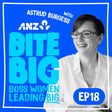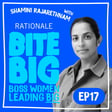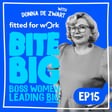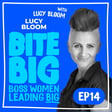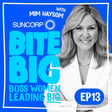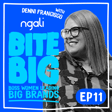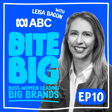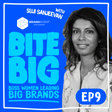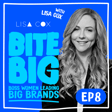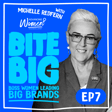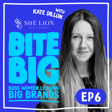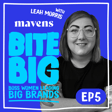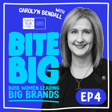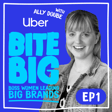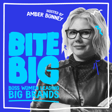Acknowledgment of Boon Wurrung People
00:00:00
Speaker
On behalf of the Bite Big team, I'd like to acknowledge the traditional owners of the land we are recording on today, the Boon Wurrung people of the Kulin Nation. We recognise that with over 60,000 years of experience, First Peoples of Australia are most definitely the original storytellers, designers and artists this country, and we pay our respect to their elders past, present and emerging.
Introduction to Amber Bonney's Career
00:00:30
Speaker
Hello, before we get stuck into this episode of Bite Big, let me tell you a little bit about who the hell I am and why this content is important to me. My name's Amber Bonney and for the past 25 years, I've been reshaping iconic Australian and international brands, helping them stay relevant, get noticed and be remembered in the good kind of way.
00:00:47
Speaker
I'm a passionate feminist and committed to advocating for better representation of women in senior creative and marketing roles, which is why this podcast is proudly brought to you by my business, The Edison Agency.
00:01:00
Speaker
If your brand or organization needs help aligning your vision to your reputation, then you can find us at www.edison.agency or you can connect with me on LinkedIn. Let's get into it.
Season 3, Episode 16 Introduction
00:01:15
Speaker
Hello and welcome to Season 3, Episode 16 of Bite Big, a podcast that celebrates bold women leading big and reshaping brands. I'm your host, Amber Bonney, founder of the Edison Agency, and today I'm co-hosting this episode with one of Australia's biggest names in brand and marketing leadership, Jenny Romanek. Welcome, Jenny. Hi, Amber. Great to be here.
00:01:36
Speaker
I'm really looking forward to this episode, Jenny. have cited you in many talks, publications, presentations, and I think the work that you are doing in being visible for women in academia is really outstanding. So I've been very much looking forward to this.
Jenny Romanek: Marketing Scientist
00:01:52
Speaker
Now, for any of listeners who are not familiar with Jenny's work, she really is one of the most respected marketing scientists in the world, most famous for her groundbreaking work on mental availability, brand salience and distinctive brand assets.
00:02:05
Speaker
She's written multiple books and in 2022 was awarded one of the highest academic honours in Australia as fellow of the Australian Academy of Social Sciences. Congratulations on that. And ah she is also in the top 1% of advertising research authors in Australia, which is an incredible achievement.
00:02:22
Speaker
You are the key architect behind the research and influence of the Ehrenberg Bass Institute. Your work has really shaped how the industry thinks about brand growth. But beyond the data, I think you bring a really sharp sense of perspective, genuine curiosity and a deep commitment to evidence versus ego, which is something this industry needs.
00:02:43
Speaker
I couldn't imagine a more powerful voice to join the Bite Big conversation. So let's kick this off and get under the skin of why we think you're a boss woman leading big, Jenny. All right, so we know the sentiment of this podcast as it comes into its third season is really about the personal mantra of each co-host. And have your mantra here, and if you'll allow me to read that out.
00:03:05
Speaker
Progress is more important than perfection.
Progress Over Perfection Mantra
00:03:08
Speaker
Talk to me about what this means for you. Well, I realised that quite early on, it's probably more recently I realised it, is that I have so many ideas and not enough time.
00:03:20
Speaker
And if I wait to get each one perfect, it's going to limit what I can do. And so now I've learned to treat time as a really valuable resource, ask myself,
00:03:36
Speaker
for the next iteration that I'm working on this, is this the best use of my time or is it better, because usually I'm working in teams, is it better given to someone else and to let go of it right now and for me to move on to something else that I can maybe make bigger strides in than the incremental benefits that I can make for something that I've been working on.
00:03:58
Speaker
So, yeah, it's really just a thing of, um you know, how do I play out most of these ideas that are in my head? Because the reality is most of the ideas in my head are actually not very good ones.
00:04:09
Speaker
Yeah. I have to get through the not very good ones to get to the really good ones. And I won't know what they are until I get to them. So I've got to give my time to get to them. Yeah. And I suppose that's the iterative nature of research, right? Is that you just, you keep evolving and changing.
00:04:24
Speaker
Is this a ah mantra that you have consciously thought about? Often we find with our guests, they don't necessarily think about a mantra from a day-to-day perspective, but is this something that you are conscious of?
00:04:36
Speaker
Yes, it is something i've I've been very intentional on of going... um And actually not just in work, in other parts of my life too. I have a garden that is a bit of a crazy one and I've just decided that it doesn't have to be perfect.
00:04:50
Speaker
Just every time I do something, it has to be better than what it was when I started. And as long as it's better than when I started, I've made progress and that's good. But if I try to go, well, I can't do anything until I've got time to make that bit perfect, I'll just never get anything done.
00:05:06
Speaker
Yeah, I love the sentiment of that also in terms of a um good for self-esteem because i don't know about you, but I have lots of ideas all the time and the curation, sometimes it's a job to just curate the ideas into things that are workable.
00:05:22
Speaker
And so this sentiment of it doesn't have to be perfect is a really great way of of filtering without any sense of shame, I suppose, that you're not achieving. Or at least giving yourself a chance to road test it.
00:05:34
Speaker
is, um you know, the worst thing you want is an idea that comes and goes and you didn't even get a chance to road test it. Now, not everything you road test is going to translate into something that's going to, you know, revolutionise the world.
00:05:46
Speaker
But if you asked me to predict, like you were kind enough to list some of the areas in which I've had a big impact, but if you'd asked me, you know, 15 years ago, can you predict what work you're working on now is going to have a big impact?
00:06:00
Speaker
I wouldn't have predicted those. They just came out of lots of different things that were happening, but they were the things that had traction, had momentum, got other people excited, which got me
Branding Errors and Consistency
00:06:10
Speaker
excited. Excited. And then, you know, I kept on going with it.
00:06:15
Speaker
Well, I suppose that's what's interesting about the imperfectness of science and branding. And so I wanted to ask about your work at the Ehrenberg Bass. Obviously, there's a lot of rigour and you know constant evolution of your thinking, but we know that that marketing and human nature is unpredictable.
00:06:34
Speaker
Can you share an example of a case study where the data might have told you one thing, but it evolved or transcribed in a different way that was unexpected? Yeah, I mean, usually it's it's it's sort of the other way around in that we take the data as kind of the North Star of how the world is.
00:06:53
Speaker
And sometimes you have ideas that don't stand up to that scrutiny. Yes. I mean, one of those, for example, is that I always thought that the biggest risk you had if you didn't get your brand name in an advertisement was that a competitor would go in its place.
00:07:09
Speaker
That, you know, if you are... Fake that opportunity, yeah. Yeah, and but it wasn't just that that that people would actively put a competitor in its place and you would it would not only be a ah null effect but actually a negative effect.
00:07:24
Speaker
But actually, when we looked at the data, we realised, oh, no, that never happens. Contubers don't care enough to go, well, I have to have a brand with that ad because it's not that important them. They're going to fill that void.
00:07:35
Speaker
Yeah, so they don't feel they don't have a void to fill. That's our issue with advertising. So what happens is if you the only time you get a competitor being put in place is when you either directly or indirectly reference it.
00:07:48
Speaker
Right. You just have a badly branded ad, nothing gets in its place and therefore it just kind of sails over people's heads. that's, you know, that surprised me and made me rethink about why branding is so important.
00:08:01
Speaker
Yeah. And I suppose that's where the value of really being consistent with your distinctive assets, because if you accidentally try to leverage another brand and your branding hasn't been strong enough, you're potentially doing the job for someone else as opposed to doing the job for yourself.
00:08:20
Speaker
Yeah, I mean, you know, you you see this. and mean In Australia, we don't have as much comparative advertising, but you are seeing it sort of sneak in. you know, Subway have been doing it sort
Challenges in Brand Consistency
00:08:30
Speaker
of indirectly against McDonald's.
00:08:32
Speaker
interesting. So why are you promoting your biggest competitor? I know what you're trying to do, but you just don't think about the downside. You can make your message without having to reference another brand.
00:08:46
Speaker
You know, why risk it? Yeah, interesting. Yeah. How do brands avoid getting stuck into this sense of perfection versus progress? Do you see that happen, especially with with sort of strategies that need to be implemented?
00:09:01
Speaker
you ever see examples of brands that are really trying to get all of their ducks in the row rather than just focusing on evolution, retesting, evolution, retesting? Yeah, I usually find...
00:09:12
Speaker
um that there's this sort of two extremes and that there are things people believe in because they've seen evidence and that's good and there are things people believe in that they just do and when you prod them for evidence, it's like the very question. It's almost a religious fervour and the very question is somewhat offensive to them. They don't like being challenged.
00:09:35
Speaker
We're such a ah ah junior science in the whole scheme of things. that we need a bit of humility um and not pretend we know all the answers.
00:09:46
Speaker
Now, that's not to say we know nothing. We do have some strong evidence-based conclusions, but that doesn't mean we know everything. And it's okay to go, yeah, I'm not so sure about that.
00:09:57
Speaker
You know, everything has a level of confidence to it And that's what I'd like to see more marketers have that mindset of I should evolve with the evidence. Yeah, the humility. i like that idea.
00:10:10
Speaker
That sense also brings about this idea that you do need to constantly listen to what the market is saying and then, you know, sort of feed that in rather than the arrogance of this is what I want it to mean and therefore that's how inherently people are going to receive that because we all know 2025 has been a great example of unexpected outcomes. So knowing, having their humility, I think that's a really great insight to be on that continuous learning journey.
00:10:38
Speaker
I think that's really important. But i think it's also important to not just listen to the people who are shouting at you and that's the danger we come in, that people are get their listening tools from their social media, that sort of thing, and they don't actually listen to ordinary people who are living busy lives and not constantly complaining on Instagram, Facebook, Twitter, X, whatever, about a particular issue because it's when you have that balanced view of what the world is that you can make smarter decisions. If you're constantly reacting to the loudest voices out there, then you're just chasing your tail essentially.
00:11:17
Speaker
Yeah. Do you see that often? I suppose you've got consumers that are ah ranting online potentially or or making themselves heard or or making a complaint or making something public for the the focus of shaming a brand versus really understanding the intent around consumer behaviour. Do you do you think sometimes that brand owners get stuck in that space?
00:11:37
Speaker
Yeah, I think, I mean, i I'm old enough to remember when we used to do focus groups, I used to do them. and And one of the things that we realised quite early is, i mean, the group was somewhat useful, but what it was, was it was a great opportunity for the client to see real consumers talking about their brand because it was pre-social media and they really didn't have that much direct contact with someone who at the end of the day was parting with money. So social media has sort of taken that spot because, you the people who came to focus groups were a little bit weird.
00:12:09
Speaker
They were often highly biased, high, heavy category or brand users because that's why they would spend the time or a bit lonely was the other reason as well. And, you know, who do we have on social media? Yeah, the same type of people.
00:12:22
Speaker
It's okay. But you do see some decisions, big decisions made based on very little feedback. I think one of the most famous examples, and I know some of the details here, but i don't know all of them, but was the gap when they changed their logo and then changed it back because of the outcry on social media.
00:12:42
Speaker
That cost them, you over $100 million because they had to change all the livery and all the stores and as well as all their marketing material. yeah And you go, well, first of all, should you have changed in the first place? It's a different conversation. But should you have reacted that much to the outcry?
00:13:00
Speaker
I don't Was it throwing good yeah good money after and what does that? say What does that say about the decision-making along the way and how does that yeah respect the insights that may have led to to change begin with?
00:13:13
Speaker
Yeah, I mean, it says that basically maybe
Implications of Frequent Brand Changes
00:13:15
Speaker
they were not that confident in the first decision that they so easily would think. So, yeah, I mean, you can argue we've actually got some work that's just come out on logo changes and that a lot of them are done for reasons that you go, I don't know why you spend that money on it. Yeah, changing leadership.
00:13:32
Speaker
Someone's looking to add to that their LinkedIn, you know, portfolio of achievements. Done something. Change the logo, change the back. Yes, yes. Yeah, I mean, we saw this recently and this hasn't finished playing out, but with the JAG rebrand, you know, my personal opinion is the whole idea of kind of branding just needs a whole rebrand in itself because everybody gets caught up in sort of the the execution rather than understanding what the long-term strategy, you may or may not be. And yeah, it's a really, it's an interesting thing how it get everybody gets caught up in the discourse of when a logo changes across so many categories. It's not even just...
00:14:11
Speaker
food and beverage or fast moving consumer goods it's kind of yes slow moving consumer goods as well but the the reasons why people make those changes we've done sort of parallel research in pack changes which was packaged goods only and then we did logo changes which was much wider spectrum but actually the underlying reasons why it happens are exactly the same almost to like the percentage points of of why people make those changes. And um yeah, and same unclear motives and errors come into play.
00:14:44
Speaker
Yeah. So it sounds like this idea of progress versus perfection seems well honed now for you Was this sort of part of your growth as a leader or is this something that you think is inherent in in how you've practiced throughout your whole career?
00:15:01
Speaker
um i Yeah, I'm not sure because i don't know. I've always had a pretty low attention span in that I tend to be one of those people has like 50 million things going on.
00:15:14
Speaker
Yeah, I resonate with that. my biggest problem was usually completion. I would have lots of things and and I would get to a point where I go and because a lot of my drive is from my own natural curiosity, it's kind of like once I've got the answer, I'm happy.
00:15:29
Speaker
And again, part of my job is actually have to share that answer with other people, which means I have to translate it from how it is in my brain to something that other people can understand.
00:15:40
Speaker
That has to be the most complicated part of that journey for you. It's the most tedious part, I will say, because that's when I get the feedback of that's not clear, I don't understand what you're going on there and sort of stuff. I'm like, this so it's so obvious to me and this sort of stuff.
00:15:57
Speaker
But I do appreciate the fact that um When people can understand what it is I'm doing, I get better feedback and it it spurs on other ideas and and that is beneficial in the long run, as well as it being part of what I'm actually paid to do in that our mission is to discover and disseminate being part of a university.
00:16:17
Speaker
So, yeah, so i've I've made peace with the fact that it's a necessary part of my job, but it's not, for me, the discovery is the fun part. I want talk a little bit about your collaboration with Professor Byron Sharp in the How Brands Grow.
00:16:31
Speaker
That's been, you know, a seminal piece of work, groundbreaking, really challenging some of the industry's sacred cows around marketing myth. If you could hit reset on the industry, what would be and outdated marketing belief you think you just want everyone to to pause and reset on?
00:16:51
Speaker
I think that differentiation is crucial for success. It's just gotten misinterpreted over the years to the point where people don't really understand what it is they're saying when they're saying that.
00:17:02
Speaker
Yeah. And what do you think they think they're saying versus what potentially it could mean? What they're saying is that I don't understand how someone can decide between brands unless one brand offers something different so that that makes someone make a decision.
00:17:17
Speaker
Mm-hmm. and do you think they mean visually different or the product is different and
Critique of Marketing Differentiation
00:17:25
Speaker
it's visually different? Because there's a whole host of things that you could deconstruct there.
00:17:30
Speaker
Yeah, I mean, well, this is and this is where it comes down to the fact that the origins, because they come in economics, are about the fact that the difference has value. So it is not just something that's aesthetically different, but it's actually that it offers you something different that you value.
00:17:48
Speaker
And so therefore it makes it makes the decision for you. yeah ah There's five credit cards. This is the only one that has a Qantas Rewards program. And so i want that card because I value a Qantas Rewards program.
00:18:02
Speaker
But guess what? How many cards can you get now that have a Qantas Rewards program? Pretty much every bank has one. So, you know, so then they go, well, that isn't differentiating more. You have to find something else to differentiate.
00:18:16
Speaker
Yeah. And do you think that the the reason that's a slippery slope is because you would be repositioning all the time? That's partially because competitors, you know, if you if you launch something that's successful, unless you've got a patent on it, yeah, you're quickly copied. And even if you have a patent on it, there's still things that people do to quickly copy things.
00:18:36
Speaker
Yeah, there are ways around that. so So what that means is, yes, you're constantly playing catch up. Now, that's not a bad thing, and and this is where people, know, the role of innovation in taking the category forward. Innovation is really valuable, and and having the category evolve is is really useful.
00:18:53
Speaker
But what happens is then you see brands sort of slipping into irrelevance, Because as they start to try to identify things that only they can say, if no one's copying you, there's probably a good reason why.
00:19:07
Speaker
That might be because it just isn't that interesting or isn't that useful. And so then you become you you're taking a brand-centric view of the world rather than a consumer-centric view of the world. What would be the simple advice you would give to sort of rethink that aside from reading your books because you talk a lot about that? But in a nutshell, what would be helpful?
00:19:28
Speaker
The time you want to be unique is with your distinctive assets. Mm-hmm. And that's the identity you have so that you always look unmistakably like you. But when it comes to what you deliver to the market, most of the time you want to satisfy the masses.
00:19:47
Speaker
You want to satisfy large segments because that's where the money is. That's where the scale is. That's where the profitability is. Now, that's not to say there isn't profitability in being a premium brand that's small, but you will be small.
00:20:00
Speaker
You will not be big in that. that is a decision that some people make you know some craft breweries do it you know a lot of categories have that premium segment but assuming that that's going to become big it's just a ah faulty assumption so it's not that every brand has to look the same it's just that choose where where you're you're focusing on this is about you as a brand Versus when you need to compete in the marketplace.
00:20:29
Speaker
Yeah. We shouldn't shy away from competition. Competition is what hones us. It makes us stronger. I mean, that's why there's such a ah focus, right, on um the idea that it's easier to be a challenger than number one.
00:20:42
Speaker
When you're number one, in some ways it makes it harder because there's a... ah human behaviour around potential for resting on your laurels. So if you know everyone's chasing you, the motivation is to work hard to to get that change. But I suppose big brands need to do that as well. They need to, you know, I suppose, behave in a way that is always learning and, as you said before, with curiosity and listening to the market.
Growth Challenges for Big Brands
00:21:06
Speaker
Yeah, I mean, unfortunately, we have a lot of metrics that are not really set up for big brands to give them warning when they're doing bad. Particularly brand health metrics are set up that yeah big brands look good, good, good until they don't.
00:21:17
Speaker
Until they don't, yeah. yeah that's I mean, big brands, they have a lot of benefits and you would always, you know, typically choose to be a big brand rather than a smaller brand. but they But they also have drawbacks as well. There's often a lot more people in decision-making process, a lot more. So we see things whereby big brands could have much bigger advantages, but they don't because they squander them too easily.
00:21:41
Speaker
The bureaucracy probably gets in the way, whereas a smaller brand potentially has more agility to, you know, respond to market and But it's also just sometimes decisions they make. So, for example, um we know from one of my colleagues' works, Ari, um that bigger brands have larger portfolios.
00:21:59
Speaker
They tend to have more options in there. But we also know from another one of my colleagues' work, Ella, that brands with bigger portfolios tend to have lower cohesiveness in the visual identity of those portfolios.
00:22:10
Speaker
So what's happening is so they're adding more options to try to grow, but they're then splintering the brand's identity in the process of doing that. So you've got two things, that one that could cause growth and one that's counter to growth, but up against each other.
00:22:28
Speaker
um So it's a bit of a shame they can't have both of them going in the right direction. What do you think the the future looks like for you know a new generation of you know marketing scientists and you know marketing professionals? Yeah.
00:22:41
Speaker
so So we have some really solid foundations now um and in terms of how brands grow and and just basically, you know, so individual level prediction is never going to be something that we're going to be good at at as a discipline because it's like, you know, trying to predict the the direction of atoms within a, you know larger object. You know, most physicists will say can't predict when any where the electron is going to go but I can predict the whole thing universe in which you're operating in.
00:23:12
Speaker
And that's the same we have in markets. Our aggregate level predictions are actually very, very good. Our individual level predictions, too many stochastic factors influencing what any one person's going to do.
00:23:23
Speaker
Yeah. So that's good. That means fewer mistakes. you were If you pay attention to it, More credibility because right now, know, a lot of the C-suite, you know, if if you have a new financial officer, they don't suddenly tell you that all their accounting systems have been rewritten.
00:23:43
Speaker
But yet you get a new marketer and you'll suddenly change direction of the stra marketing strategy and you go, how does that work that you can be going one direction one day and another direction the other day and expect they'll both get you to the same destination?
00:23:57
Speaker
having experienced the other end of that because we are receiver of briefs in marketing services. It seems to be a rite of passage for people looking to to grow their career, that it's it's about significant change.
00:24:11
Speaker
And then that sort of gets them the next role that they're looking for because there's been, you know, a short-term result. But as you know, the result can also be pretty catastrophic if you make too much change. And so potentially maybe we need to reframe the change around it's kind of on-off change versus just more 20% that are just helping evolve the brand and moving it forward but with not a significant risk? I think there's still opportunity for boldness and for risk but it's it's measured risk.
00:24:43
Speaker
So, you know, there's still exciting things happening in fields that are bound by science. and so And by scientific laws, we are just one of them that's also bound by scientific laws.
00:24:54
Speaker
So we can still launch exciting new products and yeah have really fabulous advertising campaigns and do all those things. But doing them assuming there are no constraints on us is not helping anybody. yeah So I think it's it's rosy for people coming in the future if they're willing to really get behind and understand the science Yeah, well, I think that's really, that's great advice, especially for any of our emerging listeners that might be at the beginning of their career.
00:25:23
Speaker
and want to talk a little bit about female leadership for you, because in the marketing science space, you've carved out this field, especially in Australia, that is very male dominated, and actually globally, it's male dominated too.
Women in a Male-Dominated Field
00:25:36
Speaker
And we we understand also that, unfortunately, when we think about expertise, the default is men, and typically the default is a white man. want to understand, have you ever felt underestimated in your role and your career and and how you navigated that?
00:25:53
Speaker
I mean, there's always been that often being the one female in the room, apart from maybe, you know, a receptionist or something like that is often in there. um I've often used it to my advantage more than found it to be a challenge. I've been fortunate enough that I don't have a problem speaking up in a group.
00:26:13
Speaker
So um um and I try to encourage that in others. If you've got questions, your voice is just as valid and you can ask it yeah um and see where it goes. so So I've been underestimated probably in terms of, well, because we have Byron who is such a big voice in the field, I will often get people who will assume they know what I think because they've had a conversation with Byron.
00:26:41
Speaker
Right, yeah. I've had that before. I've been turning up to a very famous marketing professor who spent the first time meeting him and he spent the first 20 minutes explaining to me what I think. And I just kind of looked at him and I was like, don't really just i know what to say. Yeah.
00:26:57
Speaker
It's like, okay, thanks for that. So that's that's usually the biggest problem I have. But I think I've, you know, as i've grown as a voice in my own right, that's less of an issue now, but it was very a big issue early on.
00:27:11
Speaker
Yeah. And what advice would you give to women in your field or any field really, but most of our listeners are sort of either marketing services or on the marketing side, about if they don't feel they have agency because not everybody has the confidence to, yeah, I suppose, feel like they have a seat at the table when they are potentially outnumbered.
00:27:36
Speaker
Know what you know. When you know what you know and you know you know that better than pretty much anyone else, that that's where you can speak up and then once you start to speak up in that area and you understand the power of actually knowing that then that gives you the confidence to start to interrogate other areas and and you know as you develop in your career you will get more areas where you have the confidence to speak up I mean, I'm not a fan of someone who just goes blustering, commenting on everything because they're asked the question.
00:28:12
Speaker
It's okay to go, you know, really I i don't have an opinion on that right now. I think we could do with fewer people having uninformed opinions. It would make for a quieter place, that's for sure.
00:28:24
Speaker
But, yeah, but just be really confident about what you do know and being willing to stand your ground in in that area and let the confidence grow from there. Yeah.
00:28:35
Speaker
Do you see yourself as someone who's broken barriers in that category? Is that something that you, especially in marketing sciences in Australia, is that something you're conscious of?
Industry Growth and Knowledge Sharing
00:28:45
Speaker
I don't pay a lot of attention. I mean, i i saw it on one level I do, but I sort of don't let it. I don't pay a lot of attention to it because to me, as I said, um what drives me is the discovery and the things I do to share that, which is usually it's in the sharing of it is when you encounter someone the you know the realization that you know you're the only female speaker on the panel or you're the you might be the headline and you there's only one other woman and there's six other males speaking on the program that sort of thing so that's usually where I counter it and I I kind of just try to focus on just presenting what I know to the world there
00:29:27
Speaker
Yeah, that's a great perspective. I want to ask about the sentiment of this podcast is is really about my personal mantra, which is bite big and chew like hell.
00:29:38
Speaker
And I want to ask, was there a ah moment or a decision or a period where you felt like you bit big and was that a positive or a negative experience?
00:29:49
Speaker
Yeah, i I mean, each year I try to take on a challenge and that takes on different forms. So some year it's learning a new data structure. So um one year a while ago, um we got access to second by second TV viewing data, which was in a totally different form than what I dealt with.
00:30:08
Speaker
And, oh my God, that took me ages to get my head around. But I learned lot in the process as well. The last time I really felt like bit big was probably writing um a Better Brand Health. Yeah.
00:30:23
Speaker
Because even though it was the last book I wrote, it really technically should have been the first book I read because it actually wrote because it went back to my early days as a researcher in the brand health sphere
Writing 'A Better Brand Health'
00:30:34
Speaker
before. Before I even thought about distinctive assets or category entry points, I was just doing research that was just about, you know, things that you find in your normal brand health tracker because I wanted to learn more about it.
00:30:47
Speaker
feel like that was more foundational than how brands grow. Yeah, well, for me it was more about this is the research that was, you know, over on and off about a decade of my life with different researchers that, you know, would come in and do their either their master's or their PhD thesis. So I'd say, hey, how about this? How about brand awareness?
00:31:07
Speaker
No one's done anything on this. Why don't you look at that and managing to persuade them that this was going to be a fun use of their time and productive use of their time. Yeah. And so the thing about it was, is I knew it was going to be a challenge because it's easy for a book on brand health to be geeky and not strategic.
00:31:27
Speaker
Yes. But if you just write a book, it's about the big picture of it. You miss the mistakes that people make, which are often quite small and dealing with measurement.
00:31:37
Speaker
I don't like semantic arguments, but I'm I become sensitive to the fact that sometimes words matter and in measurement the the words can matter a lot. The difference between saying excellent service and good service actually affects the response patterns that you get.
00:31:56
Speaker
And knowing when that is a um a feature ah ah or a bug is really important from a measurement perspective. Yeah, but I learnt a lot doing it um and I'm pleased that you know so far people have enjoyed found that book rewarding to read and valuable to read.
00:32:13
Speaker
But it was ah it was ah was a really tough write. Just to give you an idea of a good friend of mine got pregnant at the same time i sort of sat down and said, right, I'm going to seriously write the book.
00:32:25
Speaker
Her son was 18 months old before mine was delivered. Right. That's a long gestation period. was a long gestation period. For the first time, we as we were going along, she had one of those apps that you know tell you, you know, your your baby is the size of an avocado sort of stuff, whereas I'm like, well, I've done half of one chapter is that avocado size yeah no and someone should do that app for book writing yeah I like that because that would be useful for you know dissertations and all sorts of things yeah your thesis is the size of a kumquat right now yeah shout out to some women that you admire in this space that you think it doesn't even have to be in marketing sciences but you think are biting big and and leading the charge and doing great things
00:33:11
Speaker
Yeah, I mean, I was fortunate enough that I got exposure to some women leaders earlier. So the first vice chancellor of our university, Denise Bradley, and um as a PhD student, I was involved in, we used to do the the market research for our university. And I confess the only reason I did it was because I got to get up and present in front of senior management and see people Denise, who had all male direct reports, I think if I remember rightly at the time, handled the room and handled the group and do that.
00:33:48
Speaker
um And I was lucky enough to have a similar sort of exposure with Gayle King when she was CEO of St George and seeing again how these women commanded the room and shot down silly suggestions and and just handled how people were doing. You know, they were getting feedback on an ad campaign where someone was trying to paint a bad result as a learning and that was very quickly. Really? Is that something that you had to learn after the campaign or something you perhaps should have known beforehand?
00:34:20
Speaker
Yeah, that feels like a very expensive learning. Exactly. And it was, you know, and when and she wasn't shy in bringing that up in the topic. And so I think, you know, that sort of exposure helped me understand you know, just a bit about the navigation of the room and and how you command it in the sphere when, um yeah, it it might not it might not be the typical type of senior management room that you're in.
00:34:45
Speaker
Yeah, and I think that sort of exposure really helps. It can actually frame someone's career. To to see either an opportunity or to see something that someone may not think is attainable for them, to have an example actually can make a significant difference to the way someone's career and might play out.
00:35:07
Speaker
One of the things that's, I think, curious about reflection is thinking about that point of, I wish I'd, I wish I'd known, what would you sort of tell your younger self? And of course, now we have probably more access to information, whether that's a good thing or a not so good thing. Is there something that you wish maybe, you know, 16 year old or 12 year old Jenny would know had, you know, seen or read?
00:35:38
Speaker
Well, actually, I mean, I think if I was going back to my, particularly my 12-year-old self and there, I probably would say read less. I was a vocacious reader as a child. dad I probably could have benefited from communicating more and maybe learning a little bit more about communication. Yeah.
00:35:57
Speaker
Less living my head in books because I read everything. I mean, I knew an obnoxiously silly amount about the South African diamond trade.
00:36:08
Speaker
Right. Because I read my dad's books. Like every 12-year-old does. Well, I read my dad's Wilbur Smith books because I literally read through... the entire, even the ones I wasn't allowed to read, i learned if I took the book and just closed it so they didn't look a gap there, the chance of my parents noticing the book was missing and the time it took me to read was very, very slim.
00:36:29
Speaker
That's clever. My example of that was filling my parents' vodka with water so they didn't know that I was stealing it. It's Not quite as helpful in my career, but.
00:36:41
Speaker
Yeah, well, as a 12-year-old, maybe it was good. I was not doing that somewhere along the line. But, yeah, so, so yeah, so that's what I would probably, i wish i wish I'd been a little bit more exposed. And the other thing I wish in hindsight is I wish I'd gone to more concerts.
00:36:56
Speaker
Yeah. I'm seeing Cindy Lauper tonight and um one of the resolutions that I have with my husband every year is just to see more live music. Yeah.
00:37:07
Speaker
Yeah, talk to me right why that's important to you. Well, again, because I feel like there's so many opportunities. i go, oh, if only i'm um um i'm missed out on that. And sometimes you just never get that opportunity again.
00:37:19
Speaker
i mean, I was fortunate enough to see Prince three months before he died. you know, just really grateful did that. But as a younger person, there were so many different um concerts that I wish I'd gone to. Because I think there's something about those sorts of moments that, you know, stick in your memory and shape you as a person then and you can't go back.
00:37:41
Speaker
No, that's a really interesting point because I think for people that are, suppose, career focused or academically focused and knowing what you were reading at 12, I'd say you fit into that basket and the idea of living in the moment can be not something that comes naturally. So there's a beautiful sort of sentimental reminder about focusing on today. And as you said, you know, the benefit of live music is those those individuals are not going to be around forever, which is yeah how I feel about Cyndi Lauper. I guess I know. I've loved Cindy Lauper for a long time and I also just love all the advocacy work that she does in producing. So, yeah, it's really interesting.
00:38:26
Speaker
I want to ask before we wrap up, what's the best sort of career advice you've ever received? I don't know that I've ever received career advice where I've gone, that's what I should do.
00:38:39
Speaker
I've more found my own way by taking bits and pieces of lots of people where I see I like the way they do that. I like the way they do that. So whenever someone, this is why I always, you know, when people go um and you notice I deflected the question you asked me about, you know, who's individual that you admire?
00:38:58
Speaker
Yeah. I always find those questions really difficult to answer because i think to see a whole person is you see their flaws and weaknesses as well as their strengths.
00:39:10
Speaker
But if you see enough people and go, well, I like the strength that they have, I like what they do in this space, space and and to sort of cherry pick your best of the range of people around you. So ah think one of the most fortunate things you can have in a career is to actually have exposure to a wide variety of people.
00:39:28
Speaker
Because the more variety of people you have exposed to, the more you're able to see the difference how the different strengths and weaknesses play out and decide which of the weaknesses you're willing to go, yep, that's me, I'm never going to be great at that, and which are the strengths that you want to magnify and play up to in the long run.
00:39:49
Speaker
um And I think other people can teach you a lot that way. But I don't know that any one person can.
Curating Strengths from Role Models
00:39:55
Speaker
And I don't know that any one person's advice I would put in the same boat. I think advice from other people tells you more about them than about you.
00:40:04
Speaker
So I always take it anything anyone advises me with a big grain of salt and try to understand where they're coming from to give me that advice because often it tells me a lot about where they are as a person and rather than necessarily reflect what I need to do.
00:40:18
Speaker
What I love about your deflection of that question is you've just created a whole list of great advice for other people also around this sense of curation rather than complete dedication to one point of view.
00:40:32
Speaker
Well, thank you, Jenny. um It has been, yeah, such a pleasure. As I said, I've been really looking forward to this chat since we reached out a while ago. i love the idea of progress is more important than perfection. i think this sentiment of knowing what you know, ah think that is really, really great advice, especially for women, because there is sometimes this sentiment that you need to shout the loudest to be heard in ah in a room that's that's fragmented.
00:40:59
Speaker
I like that you spoke about the sense of humility that comes with learning and listening. I think that's really important. And um I resonated with this idea that there's so many ideas, but not enough time. So really treating time as a ah valuable resource, I think is yeah really important.
00:41:19
Speaker
And my last little takeout is this idea of exposure to variety.
Conclusion: Donation to Catherine House
00:41:24
Speaker
One of the beautiful things about this podcast is it's produced and made by women for women. Of course, anyone can listen, but predominantly our audience is those who identify as female.
00:41:35
Speaker
And on your behalf, we donate $500 charity of your choice. And you have chosen Catherine House in South Australia, which provides accommodation and support services for women experiencing homelessness in South Australia.
00:41:49
Speaker
And I want to ask about why why you chose Catherine House. Why is that important to you? oh just, that I mean, the statistics of women, particularly older women, um particularly generation before us that didn't have access to superannuation, um,
00:42:05
Speaker
You know, women who get divorced don't have their own home or one of the most vulnerable populations. So we need people look after them. Yeah, when I did some research about Catherine House, I really loved the, I suppose, the the peer support and the very human focus in a lot of their programs. So that's a really great charity. Thank you for that choice.
00:42:26
Speaker
Thank you. Well, I am your host, Amber Bonney, and until next episode, I hope you bite big and chew like hell. Thanks, everyone.

